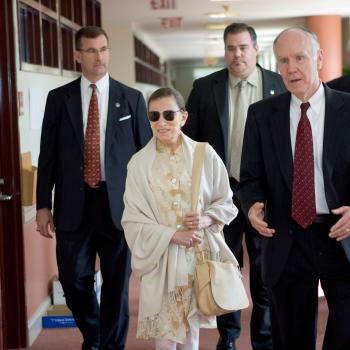Social distancing. Self-Isolation. Quarantine. We are facing a whole new reality that just a few months ago would have been unimaginable in American life. Article after article online talks about the biblical implications of plague and pandemic. There’s no need to revisit that territory. What we need to talk about instead is how we cope with isolation.
Scripture after scripture tells us about isolation. Adam in the garden. Moses on the mountain. Paul in prison. In fact, in some ways, it would appear isolation is a necessary ingredient for a complete spiritual life. This does not mean that all isolation is healthy, or there isn’t trauma attached. This post will examine the stories of three isolates in particular—Elijah, Jesus and Job—to see how they dealt with the circumstances they found themselves in.
1) Elijah, and the still, small voice of God
The Book of Kings, traditionally attributed to the prophet Jeremiah, tells the story of Elijah the Tishbite. Elijah was also a prophet, famed for a series of great miracles, including bringing and releasing drought, resurrecting a widow’s son, and so on. His ministry occurred during the reign of King Ahab, who worshipped Baal, and “did more evil in the eyes of the Lord than any of those before him” (1 Kings 16:30, NRSV).
The conflict between Elijah and the Baalists came to a head in the 18th chapter of 1 Kings, in an epic showdown atop Mount Carmel. Elijah believed himself to be the only prophet of God left, so he faced off alone against 450 prophets of Baal. Each side slaughtered a bull, placed it on an altar, and called to their god to light a fire underneath. The Baalist prophets went first. They shouted and danced and slashed themselves with swords and spears from dawn until dusk, but no fire came. The Elijah built up the altar of the Lord, poured water on it, and called down a fire from the sky that set it all aflame.
Elijah won, and exacted a fearsome penalty on the Baalist prophets, bringing them all down to the Kishon valley to be slaughtered. After this, Elijah became a fugitive from the justice of Ahab and his wife, Jezebel. He “was afraid and ran for his life” (v. 18:3). He left even his own servant behind, journeyed into the wilderness, and prayed that God would take his life instead.
“I have had enough, Lord,” he said. “Take my life; I am no better than my ancestors” (v. 19:4).
At this point, Elijah was alone and despairing in the wilderness. He still apparently believed in God, but he had lost faith completely in himself, and was ready to end his life. He lay down under a broom bush to sleep, and wait for God’s response.
God’s response was perhaps the most sensible response in all the Biblical stories of isolation:
Suddenly, and angel touched him and said to him, “Get up and eat” (v. 5).
The angels provided bread and water. Elijah lay down to sleep again, the angel came again and said, “Get up and eat, for the journey is too much for you” (v. 8). After this second attempt, Elijah was strengthened enough to travel “forty days and forty nights until he reached Horeb, the mountain of God. Then he went into a cave and spent the night” (vv. 8-9).
“And the word of the Lord came to him: “What are you doing here, Elijah?” (v. 9).
Elijah and God talked. Elijah expressed his isolation and solitude, saying he was the only prophet left. “The Lord said, ‘Go out and stand on the mountain in the presence of the Lord, for the Lord is about to pass by” (v. 11).
Then a great and powerful wind tore the mountains apart and shattered the rocks before the Lord, but the Lord was not in the wind. After the wind there was an earthquake, but the Lord was not in the earthquake. After the earthquake came a fire, but the Lord was not in the fire. And after the fire came a gentle whisper. When Elijah heard it, he pulled his cloak over his face and went out and stood at the mouth of the cave.
Then a voice said to him [again], “What are you doing here, Elijah?” (vv. 11-13)
After Elijah gave the same answer again, God sent him out to find a successor, to anoint new kings of Aram and Israel, and to connect with seven thousand new followers of the Lord. This time Elijah went, and became one of the most honored of prophets, eventually ascending into heaven in a whirlwind (2 Kings 2:11).
2) Jesus in the wilderness
In contrast with many current notions of prayer in the public square, Jesus actually commanded his followers to pray privately, in isolation. “But whenever you pray, go into your room and shut the door and pray to your Father who is in secret; and your Father who sees in secret will reward you” (Mt. 6:6). Jesus exemplified this throughout the Gospels—from Galilee to Gethsemane—but perhaps nowhere so clearly as his temptation in the wilderness.
The story of Jesus’ temptation makes up the first eleven verses of Matthew 4. Immediately after Jesus’ baptism by John the Baptist, the Spirit leads Jesus into the wilderness. He fasts for 40 days and 40 nights. At the end of this time, the “Tempter” comes to him in his hunger, and says, “if you are the Son of God, command these stones to become loaves of bread.” Christ quotes Deuteronomy, saying “it is written, one does not live by bread alone, but by every word that comes from the mouth of God.” The Tempter then asks Jesus to prove his divine nature by jumping off a tall building and letting the angels catch him. Jesus again declines, again citing Deuteronomy, “do not put the Lord your God to the test.” Finally, the Temptor offers Jesus “all the kingdoms of the world and their splendor […] if you will fall down and worship me.” For the third time, Jesus rebukes him, again quoting Deuteronomy, “worship the Lord your God, and serve only him.”
Following Christ’s temptation, the devil leaves, angels come, and Jesus goes to Galilee to begin his public ministry.
3) Job’s hard-earned wisdom
The book of Job is too famous to need much of a recitation here. Essentially, it is from the “wisdom literature” tradition, and tells the story of a faithful and successful man from Uz. So successful, in fact, that he is called, “the greatest of all the people of the east” (Job 1:3). Near the beginning of the story, Satan got God to agree to take away all of Job’s success, to see if he remained faithful when times were hard. Job lost his property. His people were attacked by Sabeans and Chaldeans. His children were killed when a house collapsed in a great wind. Job becomes ill. He moves through the stages of grief and becomes angry with God. He looks outward to see apparent injustice in the world as well. Near the end, God chastises Job. God reminds Job of his power and scope and mystery, and of Job’s relative insignificance in the great scheme of things. Job is humbled, and repents.
Along the way, Job is not physically isolated, but he experiences perhaps a greater depth of alone-ness as his friends blame him for his misfortune. In the end, God sets them straight as well, calling their judgement “folly.” Because Job never lost faith, even in his anger and grief, God restores all that he has lost and then some.
. . .
Although some aspects of these three stories still trouble me theologically, I feel like there are real lessons to be drawn from how Elijah, Jesus and Job each handle isolation, temptation and despair.
- Elijah gives up, again and again, but God reminds him, “get up and eat.” We learn from this story not to look for God in the wind or the fire or the earthquake, but instead in the still, small voice that comes after.
- Jesus is undeniably tempted in his hunger and self-denial. He could easily have given in and behaved in ungodly ways. But instead he returns to scripture—his anchor—again and again and again.
- Job feels his anger and feels his grief. These are real, valid human emotions. But he keeps his faith and in the end learns to be humble about the world and his place in it.
In the current era of social distancing and self-isolation, we are all hungry. We are all angry. We all despair. For me, at least, in times like these, these scriptures are a source of great comfort, and a real path forward. Get up and eat. Return to the stories that anchor you. Feel your grief, but keep your faith. God is with you now, and these hard times will someday come to an end.
_________
*portions of this post were inspired by a recent sermon from the Reverend Eileen Gebbie, whose blog can be found here.

















